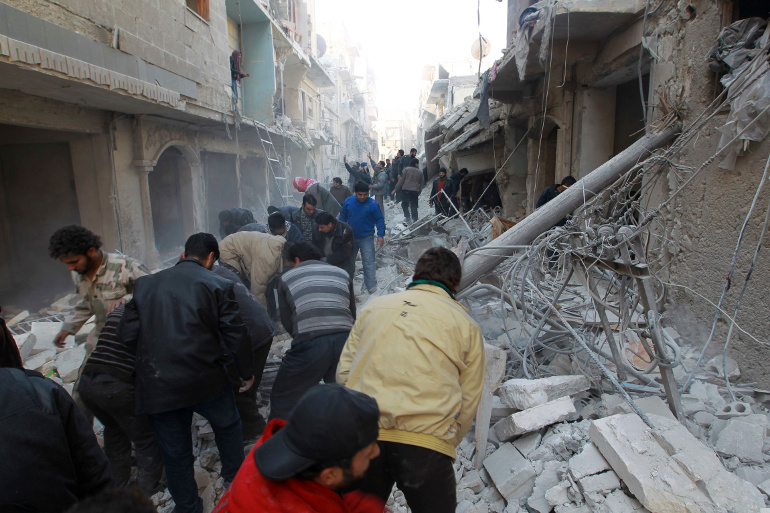
Residents search for survivors after what activists said were air strikes by forces loyal to Syrian President Bashar Assad in Aleppo Dec. 28. Former British Prime Minister Tony Blair and former Egyptian Vice President Mohamed ElBaradei are among the key political experts invited by the Vatican for a one-day meeting aimed at promoting a cease-fire in Syria, the protection of Christians there and a transitional and unified government. (CNS/Reuters/Jalal Alhalabi)
VATICAN CITY -- Former British Prime Minister Tony Blair and former Egyptian Vice President Mohamed ElBaradei are among the key political experts invited by the Vatican for a one-day meeting aimed at promoting a cease-fire in Syria, the protection of Christians there and a transitional and unified government.
The Vatican meeting Jan. 13 will come ahead of major peace talks Jan. 22 in Geneva between the Syrian government and opposition forces.
Sponsored by the Pontifical Academy of Sciences, the daylong Vatican "workshop" will seek to propose "a cease-fire to make humanitarian aid possible" in Syria; an end to "persecutions against Christians to encourage interreligious dialogue; a transitional authority to organize elections (and) a unified national government also responsible for the military sector and security;" as well as an end to human trafficking and prostitution in the war-torn nation.
The meeting's title is "Syria: With a death toll of 126,000 and 300,000 orphans in 36 months of war, can we remain indifferent?"
The eight-page program, prepared by the sciences academy, gave a brief background of the Syrian conflict. It said U.S. calls for Syrian President Bashar Assad to step down "put the U.S. in effective opposition to the United Nations' peace initiative" put forth in early 2012.
"Russia argued that America's insistence on Assad's immediate departure was an impediment to peace. In this, perhaps Russia was right," the booklet said.
However, while Russia backed U.N. peace initiatives, it also -- with Iran -- "supplied more and more sophisticated weapons to the regime" as the U.S. and other countries financed the rebels, it said.
The Vatican invited eight international experts and leaders to discuss the tragedy unfolding in Syria, the political stances of the major international players involved and possible solutions.
With opening remarks by French Cardinal Jean-Louis Tauran, president of the Pontifical Council for Interreligious Dialogue, the invited speakers are:
- Blair, founder of the Tony Blair Faith Foundation and official envoy of the Quartet on the Middle East: the U.N., European Union, Russia and the United States.
- ElBaradei, former head of the International Atomic Energy Agency, 2005 Nobel Peace Prize winner, and a major figure in Egypt's revolution against ousted Presidents Hosni Mubarak and Mohammed Morsi.
- U.S. economist and adviser Jeffrey Sachs, who is active in the world fight against poverty and hunger.
- Thomas Walsh, a U.S. expert in interreligious peace building and security, international president of the Universal Peace Federation.
- Pyotr Stegny, a former diplomat and expert in Russian diplomacy and foreign policy in the Middle East.
- Joseph Maila, a Lebanese expert on the Middle East, Islam and politics.
- Miguel Angel Moratinos, a Spanish diplomat and member of congress who served seven years as the European Union special representative for the Middle East peace process.
- Thierry de Montbrial, a French economist and expert in international relations.
The workshop program outlined Pope Francis' calls, prayers and diplomatic efforts for peace in the region. It credited Russian President Vladimir Putin with convincing U.S. President Barack Obama to not carry out its threat of military strikes on Syria in September in response to the reported use of chemical weapons against civilians by forces loyal to Assad.
With the upcoming "Geneva II" talks, the "resumption of the U.N. peace process, this time with the U.S. and Russia on the same side to prevent violence, might succeed in keeping al-Qaida at bay -- a shared interest -- and finding a pragmatic long-term solution for Syria's complex internal divisions," it said.
Meanwhile, a two-person delegation representing the Syrian government delivered a letter for Pope Francis from Assad. The letter was delivered Dec. 28 when the Syrians met at the Vatican with Archbishop Pietro Parolin, Vatican secretary of state, and Archbishop Dominique Mamberti, the Vatican foreign minister.
The Vatican confirmed the delegates gave the pope "a message" that illustrated the position of the Syrian government.
While the Vatican gave no details about the letter's contents, Syria's state-run SANA agency reported the message said Assad's government was ready for peace talks but wanted foreign countries to stop supporting "the armed terrorist groups" in Syria.
The president also said in his message that he appreciated the pope's Dec. 25 call for an end to the violence in Syria, the news agency said.
Assad told the pope "the crisis will be solved through national dialogue among the Syrians and under a Syrian leadership without foreign intervention as to enable the Syrians to determine their future and leadership through ballots," SANA reported.
The January talks in Geneva are a follow-up to a meeting in June 2012 when international parties proposed a peace plan calling for a transitional government body in an effort to end a civil war that began in March 2011.
The conflict between Assad's government and rebel forces has killed more than 100,000 people, driven 2 million refugees out of Syria and displaced more than 4 million inside the country.